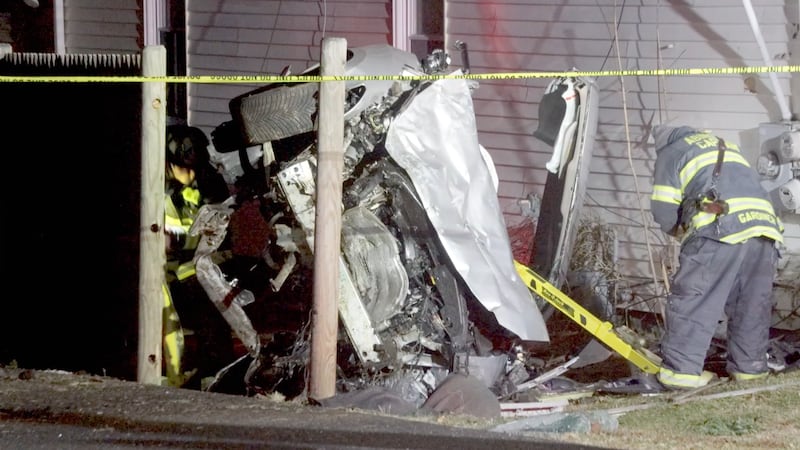BOSTON — A new bill being introduced is tackling a polarizing issue - increasing local protections for undocumented immigrants.
The Safe Communities Act, S.1401, introduced by Senator Jamie Eldridge and H.3573, proposed by Representatives Ruth Balsar and Liz Miranda “aims to restore community trust in public institutions by avoiding entanglement in immigration matters, and protect due process for all.”
The core concepts of the Safe Communities Act center around ensuring residents in the state feel safe, regardless of their immigration status. The proposal would bar law enforcement and court personnel from inquiring about someone’s legal status (unless required by law), protect due process, limit local police notifications to Immigration and Customs Enforcement agents, prohibit local and state law enforcement from posing as ICE agents and ensure local law enforcement are trained on these conditions.
On Friday, the Gardner Auditorium, which holds 600 people, had reached high capacity before the hearing on the Safe Communities Act even started. Emotions ran high as residents testified on the issue, many bringing personal stories to paint a picture of the current face of immigration in the state.
“I was talking about how, sometimes when my parents go out or almost all the time I think about if they’re ever going to come back,” said Bryan Rosa. “It’s so scary because I don’t know if they’re coming back or not and I don’t want to be without them.”
Rosa, who is just 13-years-old, holds legal status in the country - but his parent’s don’t. Overcome with emotion, Rosa testified in favor of the Safe Communities Act. When asked what his message would be to some of the people who, in the hearing, said they’re against the proposal and that undocumented immigrants are breaking the law and should leave the country, Rosa had some very powerful words for them.
“I say they don’t know what it feels like to be targeted,” said Rosa. “They don’t know how it feels to be thinking if your parents are ever going to come back home.”
Co-author of the bill, Rep. Miranda says, “immigration is a matter of life and death for most families”, going on to say they’re “not just doing this to pass laws” but because they’re “trying to save lives and keep families together.”
There was emotional and high-profile testimony to the joint committee on public safety and homeland security on both sides, a move organized by a number of statewide coalitions and grassroots community groups.
“They have no right,” said Bristol County Sheriff Tom Hodgson. “No right to undermine law enforcement in the country and diminish our ability to provide the citizens that we swore to protect and they did as well, the maximum amount of opportunity to be safe.”
Sheriff Hodgson pointed to cases like the 2011 drunk driving death of Matthew Denice at the hands of undocumented immigrant Nicolas Guaman.
“Matthew’s future was taken from him in a blink of an eye,” said Maureen Maloney, part of the organization Advocates for Victims of Illegal Alien Crime. “My son is dead because of the lax immigration laws and that fact that legislators and judges put illegal aliens before the protection of Americans.”
The MIRA Coalition explains the key features of the Safe Communities Act:
1. No questions about immigration status: Bars law enforcement and court personnel from asking people about their status unless required by law. The State Police already have a similar policy. Many immigrants fear that calling 911 or speaking to police will lead to separation from family members – especially children –making them more vulnerable to domestic abuse, wage theft and other crimes. This provision would send a strong message that in our Commonwealth, police protect us all.
2. Protects due process: Before Immigration & Customs Enforcement (ICE) questions someone in local custody, requires police to obtain their consent using a form that explains their right to decline an interview or have their own attorney present. Without these protections, people often make statements or sign documents jeopardizing their immigration cases. Non-citizens often unaware of these rights, because “Miranda” warnings are not required in the civil immigration context.
3. Limits notifications to ICE: Bars police, court officers and jail officials from notifying ICE that someone is about to be released. This would help ensure that people aren’t put in ICE detention before their cases are fully adjudicated, which denies justice to victims and due process to defendants. ICE may still be notified when a person is being released upon completing a jail or prison sentence.
4. No more 287(g) agreements: Ends contracts with ICE that allow state and county personnel to act as federal immigration agents, at state taxpayers’ expense. Such contracts are the most extreme form of entanglement with ICE, and when they shift people into ICE custody before they can go to court, they undermine due process. Massachusetts is the only state in New England to have such agreements, and we have four: with Bristol, Barnstable Plymouth counties, and the Department of Corrections.
5. Provides crucial training and accountability: Requires law enforcement agencies to train their personnel about this law, and if there is an alleged violation, people can file a complaint with the relevant agency or the Attorney General. These provisions would help ensure transparency and tackle problems as they arise.
© 2020 Cox Media Group





